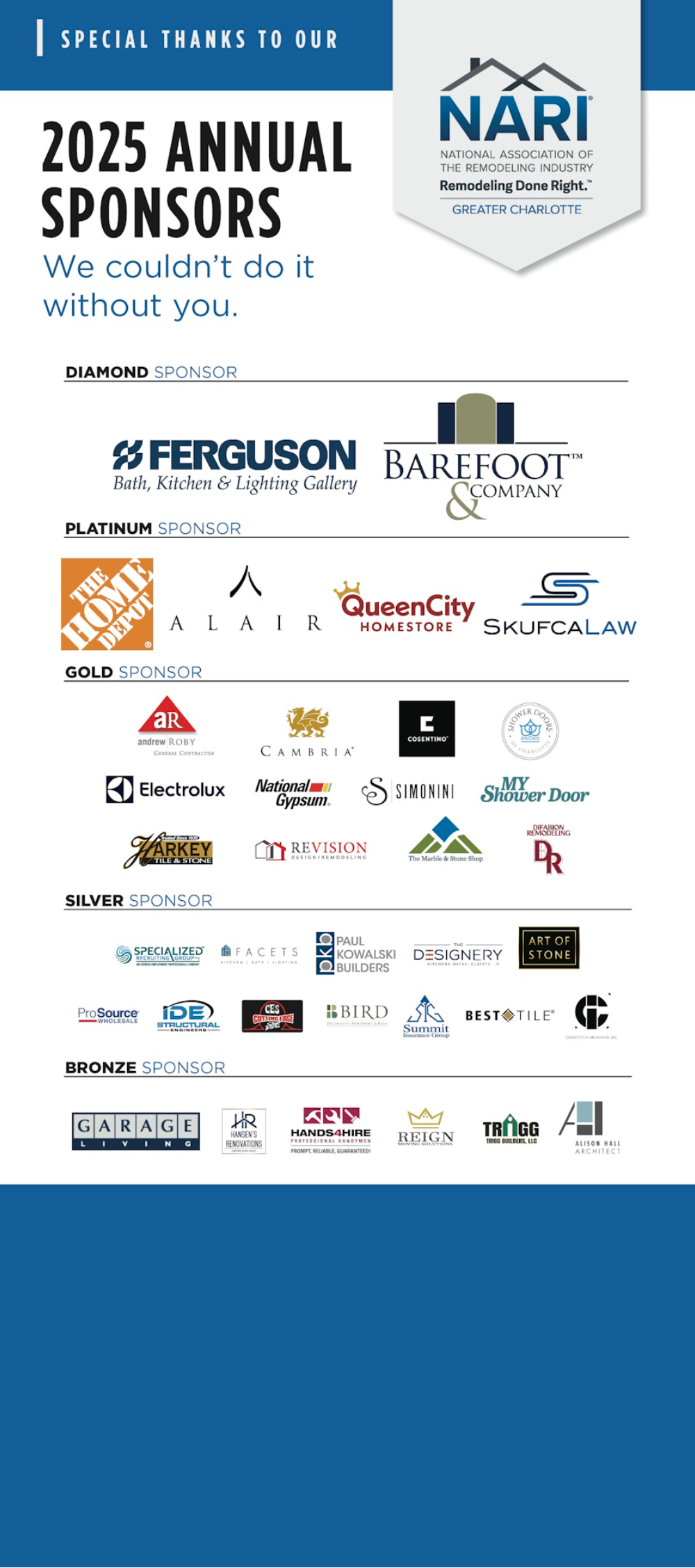-
Questions to Ask Your Contractor
-

Why should I choose a NARI member?
How many estimates should I get for a remodeling project?
How much should I set aside for unexpected expenses?
How much disruption can I expect during a remodel?
What questions should I ask when interviewing contractors?
The National Association of the Remodeling Industry (NARI) is the only independent, national association dedicated solely to the remodeling industry. The goal of the Charlotte chapter of NARI is to help homeowners in the Charlotte Metro area find the right professionals for their home improvement projects. At NARI-Charlotte, we are committed to making sure you get the maximum value for the investment you plan on making in your home. Be sure to ask remodeling contractors you are considering hiring if they are a member of NARI-Charlotte. It’s the mark of all the superior remodeling companies in the Charlotte-Metro area.
Why should I choose a NARI member?
NARI members must meet the association’s stringent criteria including being in business for at least one year, having a spotless record of customer satisfaction and demonstrating sound business practices. NARI members must also pledge a commitment to NARI’s Code of Ethics
How many estimates should I get for a remodeling project?
It depends. Conventional wisdom dictates that you get three estimates for home improvement projects. That is good advice if you have a small project like replacing a few windows, repairing your roof or installing a new fence. However, if the project is complicated and involves many different skilled trades, like in a kitchen or bath remodel, getting three estimates is not practical. Estimating these types of projects is time consuming and most reputable remodelers will require a commitment before they will spend hours and hours pulling together a detailed price proposal for your project. Do you think the companies giving out “free” estimates are spending hours doing it? If not, then what’s the estimate really worth?
Many remodelers require a retainer for their pre-construction services which can include design work, a feasibility analysis which digs into the existing conditions of your home and how those conditions will affect costs, and - finally - detailed estimating which covers all factors associated with the remodeling project so you won’t be hit with extra fees throughout the project. Every one of these steps is necessary before a remodeler can put together a comprehensive written proposal with the scope of work for your project clearly spelled out. The best advice? Don’t even think about starting a remodeling project without a detailed, written proposal from a NARI-Charlotte pro.
How much should I set aside for unexpected expenses?
Making changes and adding additional work is not unusual during a remodeling project. Once walls and floors are opened up, there may be unforeseen conditions such as plumbing lines that need to be re-routed or rotten framing that needs to be fixed before the project can move forward. Once the project starts, you may decide you really want that upgraded bathtub instead of the budget version you settled on. This is called a homeowner-initiated “Change Order” and it will increase the cost of the contract. Anticipating these unforeseen conditions and upgrades before the project begins is wise. Putting aside at least 10%, over the contract price, will make for a less stressful remodeling experience.
How much disruption can I expect during a remodel?
The amount of disruption will be different from project to project. Replacing the siding on your home will, obviously, be less disruptive than a kitchen remodel. Keeping the lines of communication open between you, your remodeling contractor, and the crews doing the work will be key. Don’t be afraid to ask lots of questions. Seasoned pros should be asking YOU lots of questions. What’s your family’s day-to-day schedule like? Where should pets be contained when work is being done? It’s important to keep the work areas off limits to children and pets - for their own safety. You will likely have a little extra dust and debris in your house, so keeping the work area “off limits” to children and pets will avoid them tracking the mess into other parts of your home.
When I’m interviewing remodeling contractors, what questions should I ask?
Look for a company with an established history and stellar reputation in your community. Avoid “fly-by-night” contractors who often work out of their trucks, don’t carry the proper insurance or licenses, and who don’t take the time to manage the financial side of their businesses. These contractors often offer amazing “deals” that may be hard for you to refuse – but there’s a reason they’re cheap! They are cutting corners somewhere and you could be left holding the short end of the stick. Most reputable contractors are proud of their history in the industry and will be happy to answer the following questions:
Who will be assigned as project supervisor for the job?
Lack of supervision is the number one reason for shoddy workmanship and projects that go off the rails.
Who can I call if the project supervisor is unavailable and there’s an emergency?
Established remodeling companies have a “chain of command” and you should know who you can call if you have questions or concerns. You should be given a contact list of key people in the company.
What is the timeline for starting and finishing the project?
Experienced remodelers have built hundreds of construction schedules and they should be able to map out the project for you from beginning to end. Ask for a calendar or Gannt chart to help you keep track of the schedule. The most forward-thinking companies use online scheduling and offer apps for your mobile phone so you can see what’s happening on your project with just one click.
What is your approach to a project of this scope?
This will give you an idea of how the contractor works and what to expect during the project. Listen carefully to the answer. This is one of the big indicators of the company’s work ethic.
How do you operate? In other words, how is your firm organized?
Does the remodeler have in-house employees or do they mainly hire subcontractors? There are drawbacks and benefits to every organization – whether they have in-house employees or primarily sub out the work. The most important question to ask is who will be supervising the work and what are their qualifications? Do they use a Certified Remodeling Project Manager or Certified Lead Carpenter to oversee the project? Most remodelers sub-contract specialty trades like plumbers and electricians. You should know what parts of your project will be handled by staff and which will be contracted out to subs.
Is your company a full-service or specialty firm?
If you are planning a small project, say replacing a vanity and faucet which doesn’t require moving any plumbing lines, you may be better off hiring a specialty plumbing firm or handyman. However, if your project involves multiple specialty trades, an addition to your home, or complicated spaces like bathrooms and kitchens - you should consult a full-service General Contractor or Design-Build firm.
Do you offer design services?
If you are considering a large or involved project, you will need design services. If the contractor does not have Design-Build capabilities, you should consider hiring an architect or residential designer. Depending on the size and scope of the project, you may need plans stamped by an architect or structural engineer in order to get a permit.
Does your company carry general liability insurance and workers compensation insurance?
Ask for copies of insurance certificates to verify coverage and ask to be named as an “additional insured” on the certificate. Don’t accept a certificate emailed, faxed or mailed directly from the contractor. The certificate should be sent to you from the contractor’s insurance agent. Don’t hire contractors who say they don’t need worker’s comp. If they get injured while working on your property – you could end up in a lawsuit!
Are any of your company’s employees certified?
Trade certifications are good indicators of a contractor’s dedication, professionalism and knowledge of the industry. Remodelers who have earned certifications are required to take continuing education courses and meet other industry criteria to maintain their certifications. NARI offers six certifications.
NARI certifications were developed to recognize highly experienced remodeling professionals, capable of planning and managing complex remodeling projects. Certified professionals represent an elite group of industry experts who possess extensive technical knowledge and project management skills that set them apart from other remodelers. There are several certified professionals in the NARI-Charlotte chapter.
Can you show me projects you have completed which are similar to mine?
The contractor should be able to supply you with a minimum of three references, including names, telephone numbers and addresses. As a follow up to this question, ask how long ago the project was completed and if the contractor can arrange a visit to see the finished job. You should also ask for professional references from suppliers, financial institutions, or subcontractors to verify sound business practices.
What percentage of your business is repeat or referral business?
This will give you a good indication about the company’s customer satisfaction. According to research conducted by NARI, most remodeling businesses attribute over 50% of their annual volume to customer referrals. Some even say up to 90%, or more, of their total annual sales come from referrals.
How many projects like mine have you completed in the past 12 months?
This will help you determine the contractor’s familiarity with your type of project. You should confirm that a good portion of those completed projects were similar to the type of project you are proposing.
Will we need a permit for this project?
Failure to obtain the necessary permits or to arrange obligatory inspections can be illegal. In some cases, if a project violates a zoning law or some other regulations, it may even have to be demolished if there is no way to comply with the law. A qualified remodeling contractor will be conscious of the permit process, and ensure that all permits have been obtained before initiating any work.
May I have a list of your suppliers?
You may want to add calling the contractor’s suppliers to your list of follow up actions. This will help protect you from mechanics liens for nonpayment by the contractor. Suppliers also can be a source to establish credit history for the company.
The Most Important Question?
Of the many questions you can ask during an interview, the most important question is one you must ask yourself:
“Do I feel comfortable with, and trust, the person I am about to hire?”
Will you be comfortable having this company manage what could end up being one of the biggest investments you’ll ever make in your home? Will you enjoy working with them – potentially for several months or, even, years? Will they be around in the future to handle any warranty work or issues that come up months after you’ve written the final check?
Don’t ignore your gut reaction. If something doesn’t feel or sound right - keep walking!











